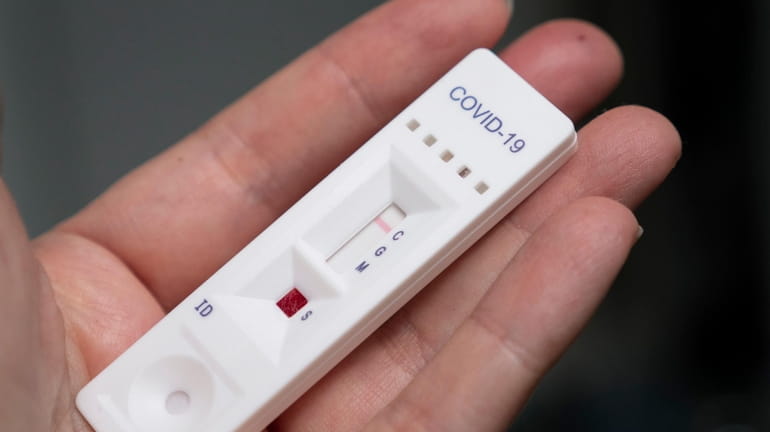Just mail COVID tests to everyone? Absolutely. My government does it.

Antigen tests can save lives by detecting active infections. Credit: Getty Images/iStockphoto/Ilze Kalve
"Should we just send one to every American?" I groaned as I watched a clip of White House press secretary Jen Psaki responding sarcastically to a reporter's suggestion that there might be better ways to improve access to rapid coronavirus tests than letting Americans get reimbursed by insurance companies for their cost. Inwardly, I screamed.
That kind of lack of imagination about how health care can work is beyond frustrating to witness once you've experienced a system that takes a different approach — one that's both simple to navigate and free at the point of service. One that, yes, provides free coronavirus tests to everyone.
I am a dual citizen of the United States and Britain, now living in Edinburgh, Scotland, and I am able get rapid antigen tests anytime I want to, at no cost and with no hoops to jump through. I know that Americans pay more than $20 for a package of two tests — if they're in stock. Here you can walk into your local pharmacy, and they will just hand you packs of seven tests at no charge. In my neighborhood I can also go to the local recreational center and collect packs of tests free for my family, or swing by a coronavirus testing center.
When I pick up tests at these places, I don't fill out any forms. I don't have to show any insurance cards. They don't even ask my name. Why would they? Collecting such information would just create unnecessary paperwork and spawn a bureaucracy to deal with it. Instead, the government just buys tests and then distributes them. That's it. No fees and no middlemen.
Oh, and if I don't have time for an errand I can fill out a quick online form and the next day a pack of seven tests will arrive in the mail at my house. The policy is that you can order one such pack per person every 24 hours.
In fact, the very day the president's spokeswoman tossed cold water on the idea of mailing out free tests, a package containing seven tests for each member of my family arrived in the mail. I'd realized the previous day that we were running low, so I placed an online order. The postman knocked when he saw I was in and handed them to me. (The packages are designed to fit through the post slots most British homes have in their doors.)
Regular rapid testing is ubiquitous here in Edinburgh, and it has helped us to return to some semblance of normal life. I have two children in high school, and the official guidance is that they should take a rapid test twice a week. When they started this regimen last school year, I had to sign a form saying my children had permission to take part. That Friday they came home laden with piles of tests for the coming weeks. The school usually gives them 24 at a time. Lately, my kids haven't remembered to go to the school office to get resupplied, so I ordered a few extra online.
For adults, the advice has also been to take a rapid test twice a week. If anyone tests positive — or has covid-19 symptoms, regardless of testing — we are advised to get a PCR test (the more accurate kind). We can get those free, too, at a National Health Service testing center or through the mail. There are priority post boxes you can drop your sample in so it gets picked up faster.
This past week, with the rise of the omicron variant, the Scottish government has asked that on top of twice-weekly rapid testing people test anytime they plan to socialize, travel on public transport or enter a public indoor space (that includes shopping). We also wear masks in public places, following a government mandate. Omicron's emergence has everyone on edge, but the system encouraging rapid testing will help Britain keep an eye on cases. When I talk about my experiences with health care in Scotland with friends and family in the United States, they are almost always incredulous. They find it hard to fathom health care with no charges at the doctor's office, no red tape, no bureaucracy, no copays, no insurance company to argue with. If you've only known the U.S. system, the concept that health care can be as simple as it is in Britain can be hard to grasp. But such a system does exist. And it could exist, too, in the United States.
Of course, the United States does not need to nationalize its health-care system to discover the benefits of free rapid testing for all. It's just common sense: Yes, Ms. Psaki, you should just send a test to every American who wants one.
James Hamblin is a journalist and physician specializing in public health and general preventive medicine. He is a lecturer at Yale School of Public Health and writes a free weekly newsletter called The Body.
